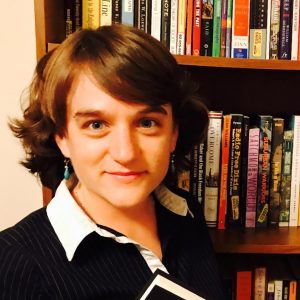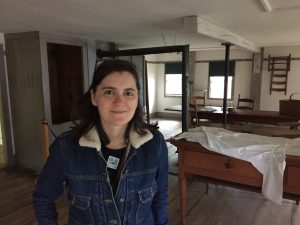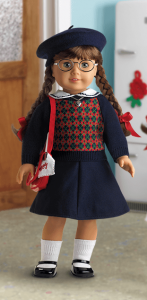

Ph.D. graduates Allison Horrocks and Mary Mahoney are taking the podcast world by storm! In addition to Horrocks’ job as a park ranger and public historian with the National Parks Service, and Mahoney’s position as a Postdoctoral Fellow in Digital Humanities at Trinity College, the UConn alums host American Girls that explores American Girl fandom, pop culture, and U.S. history. The podcast has attracted over 100,000 listeners – including NYT columnist, Margaret Lyons, who recently lauded the podcast.
To learn more about the podcast and this impressive duo’s experience thus far, check out the Q&A below!
How did this podcast come to be? Not only regarding your engagement with the American Girl world during your childhoods (which you frequently and hilariously share on the podcast), but the actual decision to make a podcast.
AH: We have wanted to do a podcast on American Girl for years. A shared interest in the “OG” American Girls was also one of the first things Mary and I discussed when we became colleagues at UConn. Starting in 2017, we workshopped ideas for this kind of show in a variety of ways before it actually debuted in 2019. Notably, Mary has the technical skills and had already created a few podcasts and digital media projects before this one. But we knew that the timing had to be right. We both needed to be done with our graduate studies, settled into our respective jobs, and able to give the amount of time this project would require each week.
MM: My grandmother bought me books for Christmas when I was growing up. I remember obsessing over each series and the magazine, but not being overly invested in the dolls or material culture of American Girl. Once I aged out of it, I promptly forgot every single plot line of these books while also maintaining it was foundational to my early interest in history. When Allison and I met at UConn, we bonded over our shared love for the series and wondered if it had a similar impact on other readers our age.
The choice to make a podcast came partly from my interest in that format. I developed a serious interest in audio production and storytelling while a student at UConn where I obtained training at the community radio station (an opportunity I highly recommend to all interested), and created and produced a podcast called Chapters. One of the great assets of podcasts are that they are so accessible – anyone can make one if they have access to an internet connection. I grew up making zines, so it seemed like a natural transition for me to seek out a way to incorporate many different voices into a form that could be easily and freely distributed. Because American Girl is a brand that self-consciously curates presentations of girlhood, this format also seemed to lend itself to our subject and has let us incorporate many voices in addition to our own.
Could you please share what was your original goal in making the podcast? Has that goal (or goals) changed with the podcast’s increasing popularity, such as a receiving a wonderful NYT review, and/or potential feedback from your audience?
AH: We do this show partially with reverence for what the series did for us as young people. Yet we also take a critical stance on the worlds created in the books. One of my goals is to share my love of history and historical studies with a wide audience.
We receive messages of some kind every single day. Truly, whenever I open up one of our social media apps, I have a new story from someone who listens. That’s the best part of doing this, other than sharing the small successes we’ve had with my best friend.
MM: I think one of our original goals was to present a conversation about books that are meaningful to us in a format that reflects our friendship and how we think about history. This is a show that asks listeners to think with history – both the history of the time periods in which the books are set and the decades (1980s, 1990s) of their original publication. The fact that we present a way of doing history that is not at all reliant on trivia, is something that has resonated with listeners who had only a passing interest in the subject.
These are books that meant something to us in childhood, and our format preserves an essential part of childhood – specifically, play. My personal goal for this show is to have fun and hang out with my best friend. I could never have predicted the response we’ve received. When we started the show, we thought we’d be recording a conversation we’d be having anyway to share with a handful of friends. Now that we’ve had over 100,000 listeners, our approach has remained the same.
How do you balance the historical details with the pop culture references while also staying on topic for the hardcore AG fans?
AH: I think the combination of pop culture and historical content is reflective of our friendship. This show is authentic to our dynamic and reflects how we really talk. If we tried too hard to plan every bit of the conversation, it would be a really different show. It’s not scripted.
MM: How we sound on air is how we sound off air, and unlike most reality shows, we are not scripted.
How would you describe this project in terms of historical categories, such as public history, digital history, material history, etc.?
AH: I consider myself squarely in the world of public history. Lots of people have reached out to us about articles or books that we mention on the show. I know that for a few people, this has been a way to learn about a topic in a deeper way that they had only been introduced to in a high school or college level history class. That’s been really rewarding to hear. Ultimately, though, this podcast is a form of entertainment.
In one of the early episodes, you mention a discussion that occurred with a professor over the historical context surrounding Felicity. Was this a UConn professor? How has your experience at UConn impacted the way you analyze these stories as well as present them on the podcast?
AH: We plead the fifth on who the professor was in that story!
We would not be able to do a lot of the work that goes into this podcast without our graduate training. UConn is also where we became friends. We had known each other before UConn (we attended the same college) but not very well.
MM: **reenacts Felicity overturning her teacup to reject tea in protest of British tea tax** “I shall spill no tea.”

Finally, which American Girl would have been most likely to declare a History Major in college?
AH: Molly, obviously.
MM: I don’t remember any of the plot lines, but am confident saying all roads lead to Molly.